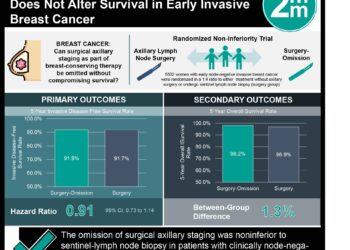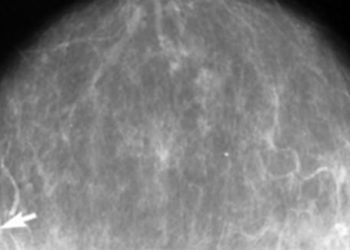Adjunctive ultrasonography increases detection rate of early breast cancer [J-START trial]
1. In this randomized controlled trial, mammography with adjunctive ultrasonography was associated with significantly higher breast cancer detection rates than mammography alone (high sensitivity).
2. Specificity was lower for mammography with adjunctive ultrasonography than mammography alone. A detailed future analysis of risk and benefit is warranted to reduce screening-associated harm.
Evidence Rating Level: 1 (Excellent)
Study Rundown: This study aimed to assess the efficacy of screening for breast cancer with ultrasonography in addition to mammography in Japanese women aged 40-49 years. Women who had no history of cancer in the past five years and were expected to live for more than five years were eligible for participation in the study. Women were either assigned to the intervention group (ultrasound in addition to mammography) or to the control group (mammography alone). Sensitivity, specificity, cancer detection rate, and stage distribution at the first round of screening was the primary outcome. In the intervention group, sensitivity was significantly higher, whereas specificity was significantly lower. More cancers were detected in the intervention group and were more frequently stage 0 and I, though fewer interval cancers were detected in the intervention group. These results support ultrasound in combination with mammography as a low-cost way to increase sensitivity and detection rates of early cancers in women with dense breast tissue. This study had sufficient power to detect a meaningful difference in sensitivity and the results therefore provide strong evidence. A weakness of this design is that it cannot be generalized beyond the first round of screening, as sensitivity and specificity were calculated from first round screening.
The study was funded by Ministry of Health, Labour and Welfare of Japan.
Click to read the study in The Lancet
Relevant Reading: A multi-centre randomised trial comparing ultrasound vs mammography for screening breast cancer in high-risk Chinese women
In-Depth [randomized controlled trial]: This randomized controlled trial aimed to assess the efficacy of screening for breast cancer with ultrasonography as an adjunctive to mammography in women 40-49 years with dense breast tissue. 72,998 Japanese women who had no history of cancer in the past five years and were expected to live for more than five years were enrolled in the study. 36,859 women were either assigned to the intervention group (ultrasonography plus mammography) and 36,139 women were assigned to the control group (mammography alone). Each group received screening twice per year for two years.
In the intervention group, sensitivity was significantly higher than in the control group (91.1%, 95% CI 87.2-95.0 vs. 77.0%, 70.3-83.7; p=0.0004) but specificity was significantly lower than in the control group (87.7%, 87.3-88.0 vs. 91.1-91.7; p<0.0003). More cancers were detected in the intervention group and were more frequently stage 0 and I, though fewer interval cancers were detected in the intervention group (184 [0.50%] vs. 117 [0.32%], p=0.0003). Cancers detected in the intervention group were more frequently stage 0 and I (114 [71.3%] vs. 79 [52.0%], p=0.0194). In the intervention group, 18 (0.05%) interval cancers were detected compared with 35 (0.10%) in the control group (p=0.034).
Image: PD
©2015 2 Minute Medicine, Inc. All rights reserved. No works may be reproduced without expressed written consent from 2 Minute Medicine, Inc. Inquire about licensing here. No article should be construed as medical advice and is not intended as such by the authors or by 2 Minute Medicine, Inc.





![Adverse pregnancy outcomes associated with thrombophilias [Classics Series]](https://www.2minutemedicine.com/wp-content/uploads/2015/07/Classics-2-Minute-Medicine-e1436017941513-75x75.png)
